And so it came to pass
ABOUT 10 years ago, the politicians who wanted to impeach then-Governor Fitial did it the hard way — some may say the right way. 2012 was a (midterm) election year, and the opposition politicians told the voting public that if they were elected to the House they would impeach the governor. That was their one-word platform: impeach. The voters responded by electing 16 pro-impeachment candidates to the 20-seat House. Their mandate was unmistakable.
During the truly historic House session to act on a resolution which had 18 — yes, 18 — articles of impeachment, one of former Governor Fitial’s political allies asked House members a question that remains eerily relevant today:
“Do we want a government where our elected governor is removed as soon as the opposition forms a majority?” asked the last CNMI Democrat to be elected governor, Froilan C. Tenorio. “It is a bad precedent to set,” he added, “and the new House majority should realize that this could happen to a governor of their party when they no longer have a majority.”
The late former governor also noted that despite the allegations of felonies, Governor Fitial had not been indicted in a court of law. “The rest of the world will look at us as no better than countries where political power ranks higher than the rule of law,” former Governor Tenorio warned.
But then again, Governor Fitial was impeached because voters elected House members who promised to impeach him. Among the charges: 1) He had ordered DPS and ports police to ensure that his AG could leave the island and “evade court jurisdiction in a criminal action”; and 2) He was the proponent of a no-bid $190 million power plant deal with a shadowy firm — a contract described by a CUC official as “disastrous” to the CNMI. These were truly grave issues that would make a mockery of the rule of law — and could potentially impose an additional financial burden on the already hard-pressed CNMI residents. And again, the “ultimate judge,” the voting public, had spoken out loud in an election. They wanted the then-governor impeached.
Today, there is absolutely no doubt that the allegations against the current governor have angered (some may uncharitably say unhinged) many people. But it is an election year, and most if not all of the charges against the governor have been referred to OPA, the AG’s office, and/or the feds — so why not allow the judicial/legal process to run its course while voters decide if he should remain governor?
But the deed has been done. Fifteen House members — who, coincidentally, are supporting other candidates for governor in a general election year — have voted to impeach the incumbent.
‘Tis the season
ELECTIONS are “seasonal.” A political party — or, in the CNMI’s case, a faction of a political party — may win today but will lose tomorrow. Not a single party or faction can be in power forever. That is the genius of representative democracy. The Republican Party may have won the most number of gubernatorial elections in CNMI history, but the GOP has never been a monolith. It has always been a loose coalition of factions that, from time to time, will splinter only to regroup and then splinter again. Ditto with the NMI Democratic Party, some of whose leading members in the not-so distant past joined a GOP faction, Governor Fitial’s Covenant group which eventually became the majority “party.”
Blueprint
A PRECEDENT has been set. A duly elected governor can be removed from office once his political opponents form a super-majority in the House.
The blueprint, so to speak, is now available to future opposition politicians. It starts with an Open Government Act request pertaining to expenditure records and receipts, among other related items. Then the steady and relentless publication — online — of some of the more eyebrow-raising items. We’re talking about government. Then and now — here, there, everywhere — its spending habits are mostly, well, questionable. (See, “The Pig Book: How Government Wastes Your Money”; “The Festivus Report 2021”; and the “2021 Congressional Pig Book.” In the CNMI, remember the “edible panties” on the list of a government board member’s official expenditures?)
Next is a call for “investigation” and/or “public hearings,” sworn testimonies, leading questions, subpoenas (optional but highly recommended) — all live streamed, every single mind-numbing, eye-rolling moment of it. With luck, you could hit the proverbial pay dirt, earn the requisite political brownie points (yes, we’re mixing metaphors now), and bring down your political opponent and/or rival…knowing fully well, of course, that it could be your turn next time around.
Democracy!









